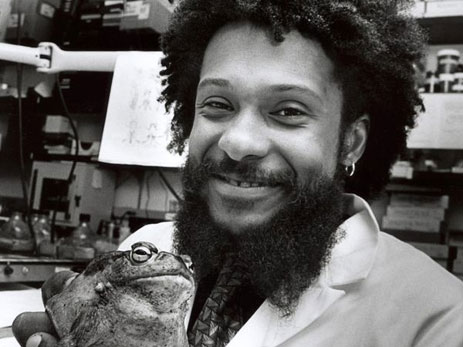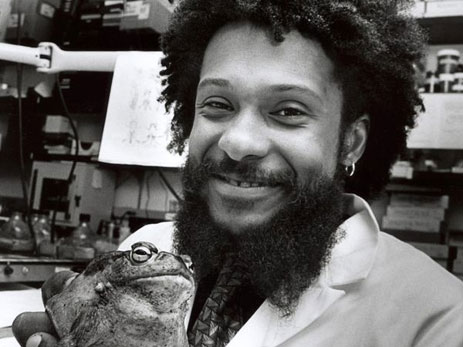 Herpetologist and atrazine researcher Tyrone Hayes in a 2002 photo. (Peg Skorpinski/UC Berkeley)The EPA is re-evaluating the safety of atrazine, one of the most widely used pesticides in the United States, and indeed the world. Several groups in the science and farming communities have called for its review over mounting evidence of its environmental and human health hazards, despite the whitewash it received under the Bush administration. The defenders of atrazine claim that it is indispensable in growing corn in the Midwest; I’ve written about the economics of an atrazine ban here.
Herpetologist and atrazine researcher Tyrone Hayes in a 2002 photo. (Peg Skorpinski/UC Berkeley)The EPA is re-evaluating the safety of atrazine, one of the most widely used pesticides in the United States, and indeed the world. Several groups in the science and farming communities have called for its review over mounting evidence of its environmental and human health hazards, despite the whitewash it received under the Bush administration. The defenders of atrazine claim that it is indispensable in growing corn in the Midwest; I’ve written about the economics of an atrazine ban here.
In the debate surrounding atrazine — Syngenta, the manufacturer, insists it is safe, despite more and more research to the contrary — a new controversy has appeared.
Syngenta has accused a leading atrazine researcher, UC Berkeley integrative biology professor Tyrone Hayes, of sending obscene and harassing emails to its staff. Hayes says he was responding to personal threats from individual staff members at Syngenta, and asserts his right to communicate in an often rhyming, rap-style voice as part of his culture.
The most important thing about this controversy is what it’s not about. If Syngenta had solid proof that Hayes’ research on atrazine was flawed, it wouldn’t need to talk about his emails. Hayes is well-known for proving, repeatedly, that atrazine is a powerful endocrine disrupter; even minute doses can turn male frogs into hermaphrodites. And, he says, frogs have the same reproductive hormones as humans: atrazine, at incredibly low concentrations, catalyzes the conversion of testosterone into estrogen in male frogs.
Anyone who can disprove that, step right up and tell us about it. That’s a question of scientific method — and that’s the question we should be talking about, in determining the safety of atrazine.
Hayes worked for Syngenta from 1997 to 2000, until the company refused to let him publish research it had funded, because he found atrazine was hazardous, not safe. He says company representatives have been following him, interrupting his speeches, and trying to discredit him ever since. On the occasions when I’ve heard him speak in public, they certainly didn’t want to leave him alone.
Now Syngenta has released a long collection of Hayes’ emails to its staff. Some of them are rude, obscene, and offensive. I wouldn’t want to receive them; I wish he hadn’t written them. But there are two separate questions about his behavior. First, when someone behaves offensively, do we immediately excommunicate them from all public dialogue, or do we weigh the offense against other things they’ve said, and continue listening to them? Second, does offensive behavior by a scientist discredit his scientific research?
Notice that ex-Senator Alan Simpson, who enjoys a generous public pension, is able to be obscenely sarcastic about everyone else’s dependence on Social Security, and to be gratuitously, viciously sexist in response to a woman activist he disagrees with — and retain his position as co-chair of an important White House panel. A commentator on NPR explained that official Washington has learned to ignore these outbursts from Simpson, because they value his long history of other contributions.
So that answers my first question: apparently you don’t get thrown under the bus until we evaluate your other contributions. In that case, let’s consider some other excerpts from Hayes’ emails to Syngenta, in which he is pouring out his heart about the experience of entering the very white world of academia:
My father used to say, “I just pray to G*d that none of my boys ever go to prison and that at least one of my boys graduates high school.”
I have never seen the inside of a prison. I graduated high school in 1985. I was then accepted on full scholarship to Harvard … In my major, I finished summa cum laude. I then completed a doctorate [at Berkeley] in 3.5 years. I was then hired, and … by age 35 [I became] the youngest full professor … ever … in the history of the university. I honored my father (who never finished high school, whose father never went to high school).
My children have attended the fancy “white private schools” that were not available to me. My son, now turning 15, is a lineman on the football team, plays two instruments in the high school marching band, is a straight A student in the advanced honors program … My daughter, now 12, is also a straight A student, plays drums, piano, is the regional gymnastics champion … I wouldn’t say that my children are better than me … that would be an insult to my father … but you know what I mean.
When I went to college, my father reported an annual income of $9,000 … I get paid $10,000 for talking for an hour … I think about that big six bedroom, three bath “white-folk” house that I bought my parents …
Me? … I am nobody from nowhere … I took the hood to Harvard and brought Harvard back to the hood … do you know what the little ones say about me when I go back for Christmas … “We saw you on tv! We learned about you in school! Can I be a scientist too?”
Do you know how many of the students in my lab were from ‘round the way? (homeless, on drugs, single parents, family members of gangbangers, etc) but found their way to me and have now graduated, gone on to grad school and med school?
My second question, though, is the more important one. None of this really matters for EPA’s evaluation of atrazine. Hayes isn’t wrong about atrazine because he is sometimes obscene and offensive. And he isn’t right about atrazine because he sometimes writes eloquently about his family and his transition from “the hood” to the university.
No, the only question that matters for the atrazine debate is whether Hayes is right or wrong about his research.
Science with an attitude is still science. Its validity doesn’t depend on whether you like the behavior of an individual scientist. Those who are attacking Hayes most loudly on other grounds might be feeling insecure about their ability to challenge him on scientific grounds. I’m not a biologist, but I’m impressed by what I’ve read of his scientific work. I’m still waiting to read something equally impressive from his critics.



